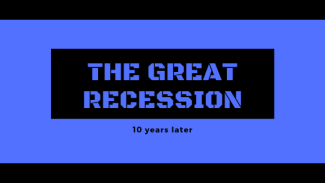
Revisiting the Great Recession, Part 3
By Gary Silverman, CFP®
Over the last two weeks, we’ve talked about the 10-year anniversary of the Financial Crisis. We first looked at the initial impetus that started mortgage demand and the reasonable profit motives that expanded the lending market. Today we look at what I consider to be the true problem: Greed.
Summary to date: People want to buy homes. The old-fashioned way for folks to pay for them meant banks loaned them money and then earned interest. That process splintered into two entities. There was the originator who created the loan with the borrower for a fee, and then there was the investor who bought the loan for the income stream it provided.
Now the greed part. Dictionary.com defines greed as “an excessive, extreme desire” and uses words like “voracity” and “ravenousness” to describe it. That paints a picture about what happened.
Remember, you had the people who never believed they would be eligible to own a home suddenly being told there were lenders ready to lend to them—They wanted the home. The mortgage companies made money by creating the mortgage—They wanted to make more mortgages. The investors wanted an income stream…especially from something that seemed pretty safe: Mortgages. More and more investors lined up to buy these products. Wall Street stepped in as the middle-man between the mortgage companies and the investors by packaging the mortgages into easy-to-buy seemingly safe packages.
Everyone wanted more mortgage lending…what could go wrong?
Well, just about everything. The borrowers borrowed what they could not afford. The mortgage companies put together mortgages that just didn't make sense and purposely skipped over steps that would have prevented mass defaults. Wall Street found new and improved ways of making even the most stupid loans saleable. And the investors hadn't a clue what they were invested in.
Of the four entities involved, all had some culpability, but the responsibility falls squarely in two areas: Those companies doing the initial lending to folks they knew couldn't afford the loans and Wall Street for marketing as safe what truly wasn't. That these two were blinded by greed and had their visions obscured by the complexities they themselves created is no excuse.
Eventually someone notices that the emperor has no clothes. That extraordinarily small group of people profited mightily from it (while at the same time almost losing all in the process). [See the movie or book, “The Big Short”.] The rest of the world found out after it was a bit too late.
Suddenly, investors realized that what they had wasn't an income stream but rather a financial time bomb. Wall Street found themselves having leveraged a product that was going down in price making any small negative movement a catastrophe. Mortgage companies found themselves holding mortgages no one wanted to buy anymore.
Borrowers found out many things. First, the economy tanked, which meant reduced or no wages for many. This made it impossible to afford their mortgages. Those that could often had loans that required refinancing within a few months or years of the crisis. But the lenders who sold them on these shorter-term loans weren’t able or willing to do that refinancing. Homes were lost, lives destroyed.
So far, so good. Then came the greed. More about that next time. Gary Silverman, CFP® is the founder of Personal Money Planning, LLC, a Wichita Falls retirement planning and investment management firm and author of Real World Investing

